Various N95 respiration masks at a laboratory of 3M, that has been contracted by the U.S. government to produce extra marks in response to the country's novel coronavirus outbreak, in Maplewood, Minnesota, U.S. March 4, 2020. Reuters/Nicholas Pfosi
Companies like Facebook, Apple, and Goldman Sachs are donating their stockpiles of face masks including N95 respirators to healthcare workers.
Companies like Facebook, Apple, and Goldman Sachs are donating their stockpiles of face masks including N95 respirators to healthcare workers.
The companies have these masks in preparation for wildfires or from past epidemics like the avian flu or swine flu.
There has been a shortage of personal protective equipment for healthcare workers all across the US.
Large institutions like Facebook, Apple, and Goldman Sachs have donated masks to healthcare workers amid shortages during the coronavirus outbreak, several news agencies reported.
Facebook donated 72,000 masks out of its emergency reserve, Reuters reported; Apple donated 9 million masks, Vice President Mike Pence said on Tuesday; and last week, New York Gov. Andrew Cuomo announced that Goldman Sachs donated 100,000 masks to his state, CNN reported.
Leslie Shribman, a spokesperson for Goldman Sachs told Business Insider in an email that the company is donating 100,000 N95 masks to both New York and New Jersey. Additionally, the company will also donate 50,000 N95s to the NHS in the United Kingdom.
Shribman also said they were also working with hospitals in states like California and Utah to send masks "based on where the needs are most acute."
N95 masks are an important protective equipment component used by healthcare workers dealing with the coronavirus. According to the Centers for Disease Control and Prevention, those masks are able to filter out at least 95% of particles in the air.
These organizations had these mask supplies as a means to protect employees from other threats, such as wildfires.
"To help, Facebook donated our emergency reserve of 720,000 masks that we had bought in case the wildfires continued," CEO Mark Zuckerberg said in a post.
Additionally, Regina Phelps, president of Emergency Management and Safety Solutions told The Wall Street Journal that some financial institutions began gathering face masks 15 years ago in light of the avian-flu outbreak in China. It was believed that face masks could protect people from being infected with a respiratory illness. Companies continued to stockpile those materials in 2009, in light of the swine flu pandemic.
A spokesperson for Goldman Sachs told the WSJ that the company's mask supply "were procured in the wake of previous epidemics."
"At this moment in time, Apple went to their storehouses and is donating 9 million N95 masks to healthcare facilities all across the country and to the national stockpile," Pence said.
Elon Musk, Tesla's CEO, also said he'll be donating 250,000 N95 masks in an email to CleanTechnica.
Other organizations like Nasdaq Inc. and Mastercard have also pledged to donate masks, The Journal reported.
Healthcare workers and experts all across the country have said there's a shortage of personal protective equipment needed to help doctors and nurses tackle the coronavirus outbreak, Business Insider previously reported.
The US has more than 54,000 COVID-19 cases with at least 700 deaths.
Facebook and Apple did not immediately respond to Business Insider's request for comment.
Apple is donating 9 million protective face masks to help fight the coronavirus pandemic
Apple is donating 9 million protective face masks to COVID-19 relief efforts in the US, the Vice President Mike Pence said in a press briefing on Tuesday.
The vice president said he and President Trump recently spoke with Apple CEO Tim Cook.
Cook is one of several tech CEOs that has pledged to donate face masks, along with Facebook CEO Mark Zuckerberg and Tesla CEO Elon Musk.
Apple is donating 9 million protective face masks to help combat the ongoing coronavirus pandemic, Vice President Mike Pence said during a press briefing on Tuesday.
"And I spoke today, and the president spoke last week, with Tim Cook of Apple," Pence said. "And at this moment in time Apple went to their store houses and is donating 9 million N95 masks to healthcare facilities all across the country and to the national stockpile. "
Cook recently said on Twitter that Apple would be donating "millions" of masks to workers in the US and Europe, while Pence also previously said the company would be providing 2 million masks.
"Our teams at Apple have been working to help source supplies for healthcare providers fighting COVID-19," Cook wrote on Twitter on Saturday. "We're donating millions of masks for health professionals in the US and Europe. To every one of the heroes on the front lines, we thank you."
Apple is one of several technology giants donating masks as the US grapples with supply shortages as the coronavirus spreads.
Doctors in at least two hospitals in New York City, which has been a hotspot for COVID-19 infections, have been told to reuse their masks to preserve their supply, Business Insider's Jacob Shamsian reported earlier in March. In Los Angeles, some doctors are turning to seamstresses in the city's garment district for new masks.
Facebook CEO Mark Zuckerberg also recently said the company will be donating the 720,000 masks it had purchased as a protective measure against the California wildfires and plans to source millions more.
Tesla and SpaceX CEO Elon Musk also recently said in an email to CleanTechnica that he'll be donating at least 250,000 N95 masks.
N95 respirators are different than surgical face masks in that they're able to form a tight enough seal to filter out at least 95% of particles in the air, according to the Centers for Disease Control and Prevention. Surgical masks, comparatively, are loose-fitting and protects the wearer from large droplets and splashes.





